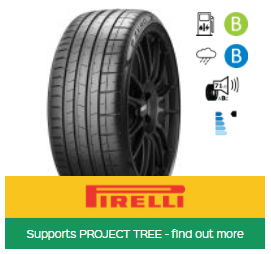Introducing PROJECT TREE for a More Sustainable Natural Rubber Future
Jack Dreyer | Thursday 19th September 2024 4:00pm

Update - March 2025
Following a successful UK project, we are no longer actively participating in Project Tree. This decision comes as the incoming European Union Deforestation Regulation (EUDR) rules will build on Project Tree’s achievements, setting new standards for a more transparent natural rubber supply chain. Project Tree has been a global leader in this space, and it’s encouraging to see the EUDR take these efforts further. Meanwhile, Project Tree continues to grow in Indonesia, contributing to EUDR-compliant supply chains for several of our premium tyre manufacturers.
In the modern world, we are more reliant on tyres than ever. At the end of March 2024, there were 41.4 million licensed vehicles in the UK, an approximate 87% increase since 2020, and trends suggest that this figure is likely to keep on rising with tyre usage increasing alongside it.
With increased tyre usage comes an increased demand for both natural and synthetic rubber, which in turn brings its own complications, with both environmental and humanitarian implications. That’s why we, at Kwik Fit, are delighted to announce our participation in PROJECT TREE (Transparent Rubber Ecosystem for Earth): a new initiative to help provide a more sustainable supply chain for tyre production.
What is a tyre made of?
Did you know that the natural rubber in your car tyres comes from trees? If not, you may be surprised to learn that your tyre holds up to 200 raw materials, including natural rubber, synthetic rubber, steel, and silica. These materials are combined using a series of processes to create different types of tyres for different driving conditions.
Approximately 15% of a car tyre is made up of natural rubber, which is farmed by tapping rubber trees. Over time this has put increasing pressure on rubber tree yields in Asia, where 90% of the world’s natural rubber comes from.
Natural rubber supply issues
The increased demand for natural rubber has had a huge impact on those who produce it, while? output has dropped in recent years due to a number of factors:
- Market cost has dropped below the cost incurred by farmers
- Very low profit potential and wages
- Reduced yields per hectare due to unsustainable farming practices
In nations such as Indonesia, where large amounts of natural rubber are produced, this has led to huge deforestation, unsustainable farming techniques, and human rights challenges. As demand for natural rubber continues to grow, the industry faces challenges that need to be addressed and resolved, including the environmental sustainability of the industry and the long-term viability of peoples’ livelihoods.
This is where PROJECT TREE aims to help.

How does PROJECT TREE help?
With the demand for natural rubber only projected to increase it is clear something needs to be done urgently. Working closely with key stakeholders throughout the entire supply chain, PROJECT TREE uses blockchain technology to revolutionise traceability in the natural rubber supply chain with an approach that is both fairer to stakeholders and more sustainable for the environment. PROJECT TREE’s key goals include;
- Increase the long term sustainability of the natural rubber industry in Sumatra (Indonesia)
- Educate and reward ecologically friendly farming practices aligned with improved traceability of supply to the tyre industry
- Reduce illegal deforestation and improve the livelihoods of producers
PROJECT TREE’s Traceability System
Technological advances have enabled PROJECT TREE to develop a sophisticated traceability system that will help to tackle certain issues in the rubber industry, including illegal logging and rights violations against local communities and farmers.
The traceability system, which has been built in partnership with multiple stakeholders, utilises blockchain technology to allow mutual authentication via smartphone or web applications. This authentication provides proof of details such as dates, times and geolocation data to ensure transparency throughout the entire supply chain – all the way from the farm to the processing plant and indirectly helps protecting conservation areas and wildlife.
Not only will PROJECT TREE allow for more transparency - it will also provide incentives to farmers and small businesses that record transactions. Incentives are paid either in cash or through education and access to supplies and better equipment (better agricultural practices training or provision of supplies such as farm equipment and fertilisers).
How can you help to support PROJECT TREE?
If you want to help us in our mission to improve conditions across the natural rubber supply chain, make sure to keep an eye out for tyres that ’Support PROJECT TREE’ next time you need a replacement. There are currently dozens of products from world-renowned brands, including Hankook, Pirelli, and Continental, supporting PROJECT TREE and we are looking to add many more tyres to this collection.
Look out for the PROJECT TREE banner next time you are searching for tyres online, or ask one of our tyre experts at your local Kwik Fit centre.
And, in the meantime, keep up-to-date with the latest motoring news and trends on our blog.
Any facts, figures and prices shown in our blog articles are correct at time of publication.
Featured Articles
Is it Illegal to Drive With One Headlight?
Saturday 19th July 2025
Wondering if it’s illegal to drive with one headlight? Learn about the safety risks and penalties of illegal blown bulbs and why you should fix them promptly.
Air Con in EVs & Hybrids: Experts Answer Your Questions
Monday 30th June 2025
Does air con drain EV batteries? Can you use the air con while charging an electric car? Find out the answers to these questions & more from Kwik Fit’s experts.
Why Is Your Car Making a Noise? Fixes & Tips
Friday 13th June 2025
When your car starts making unexpected noises, it can certainly be quite disconcerting; it may be nothing to worry about, but here’s what you need to know.










